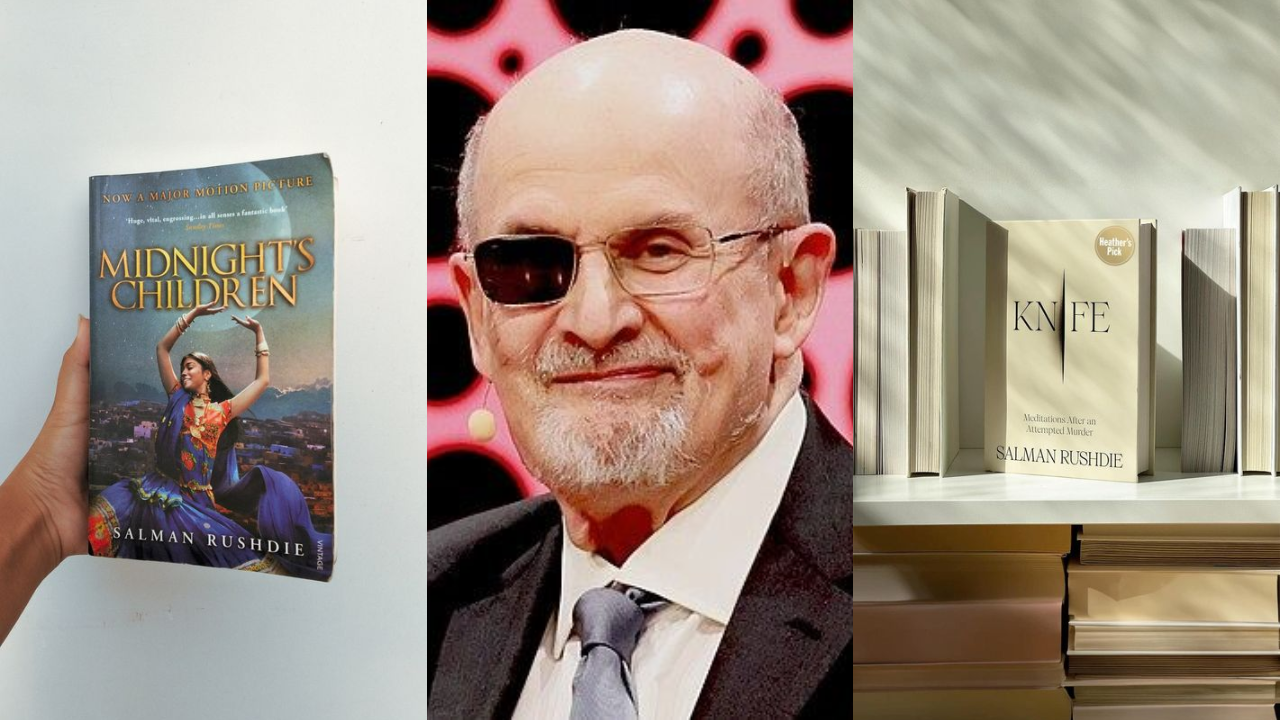
Salman Rushdie Books in Order (Image Credit: Instagram)
Salman Rushdie is a major figure in modern literature, known for his amazing stories and bold exploration of complex themes. Over several decades, he has written many acclaimed books that have made a lasting impact on the literary world. If you want to explore his works, here is a complete guide to Salman Rushdie’s books in chronological order.
1. Grimus (1975)
Rushdie’s first novel, “Grimus,” is a fantasy adventure about Flapping Eagle, a young Native American who goes on a quest to find immortality.
2. Midnight’s Children (1981)
Considered Rushdie’s greatest work, “Midnight’s Children” is an epic story that mixes India’s personal and political history. It is told through the eyes of Saleem Sinai, a boy born at midnight on the eve of India’s independence.
3. Shame (1983)
Set in a fictional country reminiscent of Pakistan, “Shame” explores themes of power, corruption, and national identity against the backdrop of political turmoil.
4. The Jaguar Smile (1987)
Part travelogue, part political commentary, “The Jaguar Smile” offers Rushdie’s reflections on his visit to Nicaragua during the Sandinista revolution.
5. The Satanic Verses (1988)
Perhaps Rushdie’s most controversial work, “The Satanic Verses” is a surreal and provocative exploration of faith, identity, and cultural clash that sparked international controversy and earned Rushdie a fatwa from the Iranian government.
6. Haroun and the Sea of Stories (1990)
Written for his son during the difficult time after “The Satanic Verses,” “Haroun and the Sea of Stories” is a playful and magical story that celebrates the power of storytelling and imagination.
7. Imaginary Homelands (1991)
A collection of essays and criticism, “Imaginary Homelands” offers insight into Rushdie’s thoughts on literature, politics, and identity in a globalised world.
8. The Moor’s Last Sigh (1995)
Set in India against the backdrop of political and social upheaval, “The Moor’s Last Sigh” follows the tumultuous history of the Da Gama-Zogoiby family through the eyes of its last scion.
9. The Ground Beneath Her Feet (1999)
“The Ground Beneath Her Feet” is a modern take on the Orpheus and Eurydice myth, set in the world of rock music. It explores themes of love, fame, and the power of art.
10. Conversations with Salman Rushdie (2000)
A collection of interviews with Rushdie conducted by various journalists and scholars, offering insights into his life, work, and creative process.
11. Fury (2001)
Set in contemporary New York City, “Fury” follows the tumultuous life of Malik Solanka, a former dollmaker who becomes consumed by rage and desire.
12. Step Across This Line (2002)
Another collection of essays and reflections, “Step Across This Line” explores a wide range of topics, including politics, literature, and the changing landscape of the modern world.
13. Shalimar the Clown (2005)
Spanning continents and decades, “Shalimar the Clown” is a story of love, betrayal, and revenge set against the backdrop of Kashmiri politics and culture.
14. The Enchantress of Florence (2008)
Blending history and mythology, “The Enchantress of Florence” tells the story of a mysterious traveller who arrives in the court of the Mughal emperor Akbar, claiming to be the long-lost relative of the emperor’s favourite concubine.
15. Luka and the Fire of Life (2010)
A companion to “Haroun and the Sea of Stories,” “Luka and the Fire of Life” follows the adventures of Haroun’s younger brother as he embarks on a quest to save his father, who has fallen into a mysterious coma.
16. Joseph Anton: A Memoir (2012)
Rushdie’s memoir tells the story of his life under the fatwa issued after “The Satanic Verses” controversy. It offers an honest and deep look at a very challenging time in his life.
17. Two Years, Eight Months and Twenty-Eight Nights (2015)
A fantastical story that spans centuries and dimensions, “Two Years, Eight Months and Twenty-Eight Nights” explores the clash between reason and faith, science and superstition.
18. The Golden House (2017)
Set against the backdrop of contemporary America, “The Golden House” is a story of wealth, power, and corruption that unfolds in the shadow of a mysterious immigrant family.
19. Quichotte (2019)
Inspired by Miguel de Cervantes’ “Don Quixote,” “Quichotte” is a modern-day retelling of the classic tale that explores themes of love, loss, and the search for meaning in a chaotic world.
20. Victory City (2023)
Set in an alternate reality where the Axis powers won World War II, “Victory City” imagines a dystopian world where freedom and individuality are suppressed.
21. Knife (2024)
“Knife” by Salman Rushdie is his newest novel, exploring today’s issues with deep insight. It promises to engage readers with its look at modern problems and timeless themes.
